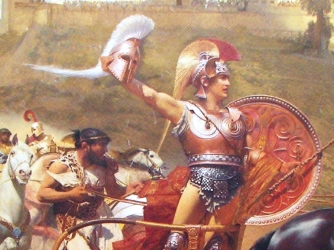From the very first lines of Shakespeare’s play, it is clear this is not a retelling of the Iliad. The first line: “in Troy, there lies the scene,” (1.prologe.1) firmly places the reader inside the city of Troy. The first lines of the Iliad, widely known today, and even more celebrated in Shakespeare’s time, speaks of the anger of Achilles. It asks to “Sing, O Goddess, the anger of Achilles” (Illiad, 1.1). The discrepancy of these first two lines immediately displaces the reader into a new retelling of Homer’s original epic poem. Ultimately begging the question: is Troilus and Cressida a Homeric retelling or is it in fact antihomeric?
Homer’s poem explains the anger within Achilles, rooted in a fight with Agamemnon over what more specifically, who, he is due. Beginning in the Achaeans camp on the outskirts of Troy, Homer’s poem focuses on Achilles anger; anger evolving into a protagonist of its own accord. The differences between the two, the play versus the poem, endure. The two most shocking plot differences are the banquet held by Achilles in which both sides lay down their arms and feast together in peace, and the killing of Hector. The former plot point does not exist in Homer’s and the latter is incredibly and shockingly different. The death of Hector in the Iliad is a moment of intense revenge for Achilles who seeks to avenge the death of Patrokles. His success in the destruction of Hector places him as the ultimate hero, one capable of killing such an epic warrior. However, in the play, Achilles takes advantage of Hector, murdering him with a troupe of Myrmidons. Hector’s last words are “I am unarm’d,” (5.8) begging Achilles to play fair. Achilles is seen, at this moment, as a man who takes advantage of Hector and does not give him a fair death, he does not allow the hero a hero’s death.
Finally, the naming of the play, the decision to focus on two side characters in the Iliad, two characters who are not central in Homer’s epic, is an interesting decision by Shakespeare. Even more so, the namesakes of the play are barely central figures. They have limited interaction together, and the play is filled with more central protagonists. Even with their limited interactions, the play at its heart is a love story. It cannot be Shakespeare’s own revamping of Homer’s poem because it tells not a story of war and heroes and death and combat.
George Bernard Shaw’s speech for the ‘New Shakespeare Society’ in 1884, speaks of how ‘cynical’ and pessimistic Shakespeare was with regards to Homer. He claims Shakespeare sought to quash “Homer’s attempt to impose on the world” (53). Shakespeare takes the character Homer upheld to his highest standard of heroism, Achilles, and creates a figure entirely different and void of heroic values. Therefore, through differences in plot points, the figure of Achilles, and the namesake of the play, Shakespeare plays the pessimist and creates an anithomeric retelling of Homer’s The Illiad.
Source:
- Lattimore. 2011. The Iliad of Homer. University of Chicago Press.
Shaw’s 1884 Lecture on “Troilus and Cressida”.Louis Crompton and Hilayne Cavanaugh.The Shaw Review .Vol. 14, No. 2, SHAW/SHAKESPEARE ISSUE (MAY, 1971) , pp. 48-67.

